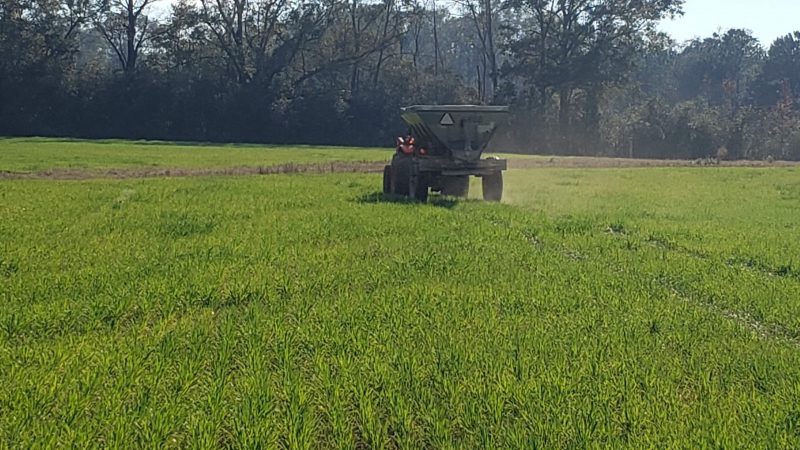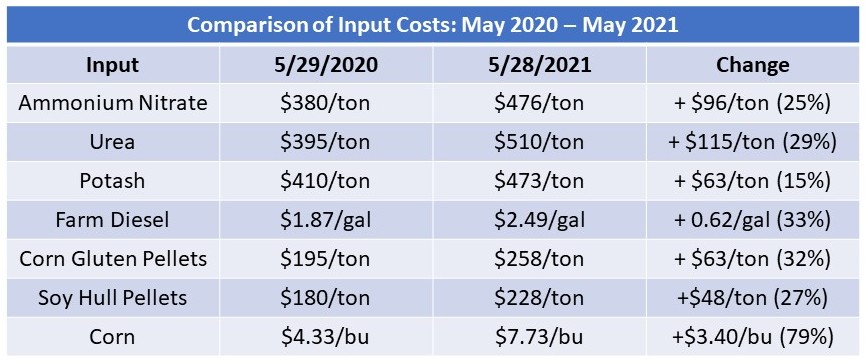
The cost of inputs, like fertilizer, have risen considerably over the past year, while calf prices have remained fairly flat.
Photo credit: Mark Mauldin
–
I have a habit, good or bad, of saving emails. There are a ridiculous number of folders in my inbox where I file away emails on the off chance that I might need the information they contain at some later date. Recently my electronic hording actually paid off.
After several recent conversations with cow/calf producers all centering around the current cost of fertilizer, feed, and/or fuel. I decided to look through my files and attempt to quantify how much the costs of these inputs have changed over the past year. For this type of analysis, I looked in my inbox file housing countless editions of Alabama Livestock Market News – a great resource that helps me keep tabs on cattle and input prices for the state of Alabama. All the prices referenced in this article are courtesy of the Alabama Livestock Market News. I know we are in Florida, but the cattle producers of NW Florida do a lot of buying and selling in Alabama. I compared the report from May 29, 2020 to the report form May 28, 2021. The table below details my findings.
I am sure producers are are that input costs have been steadily increasing of late but seeing the actual numbers – the fact that everything has gone up and how much it has gone up was startling! That said, I made another discovery when comparing the reports that further punctuated the situation in which producers currently find themselves. The average reported price for a 525lb #1 steer was exactly the same in both reports ($1.43/lb, $751/hd). Granted, this comparison is just for one state, one week, and one class of animal, but it goes a long way towards making a point.
Dealing with rising input costs is never fun, but when revenue is completely flat-lined it’s even harder to take. A few weeks ago, my colleagues published Managing Cattle Herd Profitability with Rising Input Costs; the article addressed the current situation in terms of making management decisions to minimize costs. The other side of the solvency equation involves management decisions intended to increase revenue.
Cow/calf producers are almost always price takers, which can make managing to increase revenue quite challenging. I’ll say it plainly – I do not have the proverbial silver bullet for increasing revenue. However, given the current market conditions I think it is important for producers to make extra effort to maximize their revenue potential. The key principles of increasing revenues generated by a cow/calf operation are rather straight forward:
Sell more pounds
and/or
Make the pounds you sell more valuable
To quote an infamously mustachioed professor (Dr. Todd Thirft) I had many years ago as a student at UF, “Pounds drive the system.” If prices are flat, you increase revenue by selling more pounds, or you find a way to make the pounds you sell more valuable. Translating these simple principles into real-life has always been complicated, but it will be even more so now with inflated feed and fertilizer prices. Over the next several weeks I will post a series of articles discussing possible ways cow/calf producers can increase revenue. My hope is the series will help you to think critically about your operation and perhaps find a path to increasing the revenue from your herd.
Ramblings on Revenues
Upcoming Articles
Sire Selection – Using Genetics to Increase Revenue – June 25
Maximizing Revenue Through Reproductive Management – July 16
Marketing Cull Cows to Maximize Revenue – July 23
Managing Claves to Maximize Revenue – July 30
Weaning Decisions to Maximize Revenue – August 13
Marketing Calves to Maximize Revenue – August 20
–
The titles alone might be enough to get you thinking about different possible ways your operation could generate additional revenue. If you have questions about the topics listed you don’t have to wait for the article to be published, feel free to contact me or your county’s UF/IFAS Agricultural Extension Agent for more information.
- 2026 Florida Bull Test Sale – Performance Data Evaluation Simplified - January 9, 2026
- Panhandle Corn & Soybean Update Friday – February 6 - January 9, 2026
- Peanut Maturity Update – 10/9/25 - October 10, 2025

